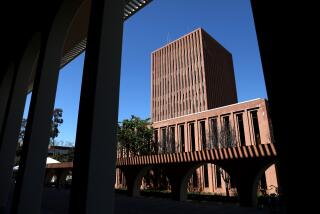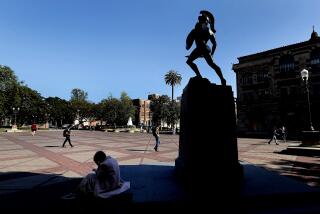‘Major Concerns’ : Panel Threatens USIU With Accreditation Loss
- Share via
United States International University is threatened with the loss of accreditation, a potentially devastating action, because it purportedly has “deviated substantially” from guidelines set by the organization that accredits senior colleges and universities in California and Hawaii.
The Oakland-based Western Assn. of Schools and Colleges has threatened to withdraw USIU’s accreditation March 15, 1991, unless the university corrects six “major areas of concern” ranging from serious financial problems to low staff and faculty morale.
‘Leadership Lacking’
“Fundamental elements of sound institutional planning, leadership, administration and governance are not in evidence, and the prospects for improvement in the institution are bleak,” according to a public statement released Wednesday by the association, which accredits 140 institutions. “As a result, the quality of education provided to students at USIU is in jeopardy.”
The public statement, based on a recent inspection performed by a 14-member committee, seemed to hit hard at the leadership provided by USIU founder and President William C. Rust.
“Since the function of a university reflects its leadership, the commission wishes to stress the central importance of leadership in resolving the crises that now con front the university,” the statement said.
Officials at USIU, a 37-year-old institution in San Diego, maintain that the university has taken steps to ensure that accreditation continue past March, 1991.
“The process of revitalizing the management of the university actually began nearly a year ago,” said Joseph Merante, a USIU provost and senior vice president. His comments came during a Wednesday-evening press conference in USIU’s library.
Merante was confident that, as USIU “provides . . . full details of the crucial improvements,” the association “will renew its accreditation for many years beyond 1991.”
Merante also dismissed the association’s bleak description of USIU’s future as “a value judgment.”
USIU, formerly known as California Western University, changed its name in the early 1970s, shortly after relocating to its campus near Miramar Naval Air Station. It had been on a stunning, oceanfront campus on Point Loma now occupied by Point Loma Nazarene College. The university has 3,500 graduate and undergraduate students in its campuses in the United States and throughout the world. Of that total, 2,550 are at its San Diego campus.
USIU last ran into serious accreditation problems during the 1970s but has been fully accredited since then, the association’s executive director, Steve Weiner, said Wednesday.
The most recent accreditation questions arose as part of a regularly scheduled, five-year review of USIU’s educational programs, finances, physical resources and institutional goals.
Evaluated Around the World
During late 1988, a 14-member study team composed of college and university administrators and faculty members from throughout the nation visited USIU’s campuses in London, Nairobi, Palau and Mexico City. That team visited the San Diego campus this spring.
The committee applauded USIU’s dedication to “international education” and determined that “USIU has a committed and dedicated faculty that is one of the university’s greatest assets.”
But it also alleged that USIU has “deviated substantially from standards.”
The “show cause” order that the accrediting group issued is far more serious than a private warning or a probationary period, according to Weiner. “This is not routine by any manner or means.”
The evaluation said morale among USIU’s faculty and staff is “alarmingly low, the university has serious financial problems, the university’s financial information does not describe its financial condition with clarity or candor, the university lacks prudent financial-management policies” and “the university fails to meet its basic responsibilities” to the association and the accrediting process.
Merante contended that the serious financial deficiencies alleged in the report are the result of a “difference of opinion” over when USIU should sell assets to alleviate seasonal cash-flow problems.
Merante, who was unable to say whether the university has been running a deficit in recent fiscal years, did say that USIU’s assets (including real estate and securities) outweigh its liabilities 5 to 1. USIU is, for example, the “majority shareholder” of KUSI-TV, a local television station, Merante said. It also holds land near its campuses in San Diego and around the world.
He also dismissed the contention that morale is low, arguing that the committee did not talk with the majority of university employees, who he said are “positive, confident, exciting.”
‘Damn Serious Thing’
Merante declined to speculate on USIU’s future should it lose accreditation.
However, the loss of accreditation would be “a damn serious thing for USIU,” according to a local university administrator who is familiar with the accreditation process. “Accreditation constitutes a kind of life-and-death situation for an institution. . . . If you don’t become accredited, students tend to stay away.”
College and university administrators depend upon accreditation to determine the quality of education offered by diverse universities and colleges in far-flung locations.
Accreditation is important for transfer students because it determines how many courses can be transferred from one institution to another. Only successful graduates of accredited undergraduate schools, for example, are eligible for graduate programs offered by California’s state institutions.
Equally important is the fact that non-accredited institutions generally fail to qualify for federal funds. That means students at non-accredited universities and colleges do not qualify for federal student loans, and federal funds could be withheld from administrators and professors.
“At this point, the ball is really in the university’s court,” Weiner said. “We are asking them to respond to particular concerns.”
The accrediting group will review the situation during a return visit to USIU’s San Diego campus in late 1990, Weiner said. In the meantime, USIU officials “will be expected to give a written report in preparation of that visit,” Weiner said, adding that he expects further action by the association in 1991.
More to Read
Sign up for Essential California
The most important California stories and recommendations in your inbox every morning.
You may occasionally receive promotional content from the Los Angeles Times.










